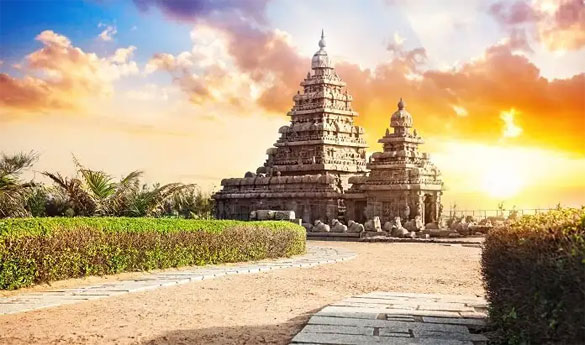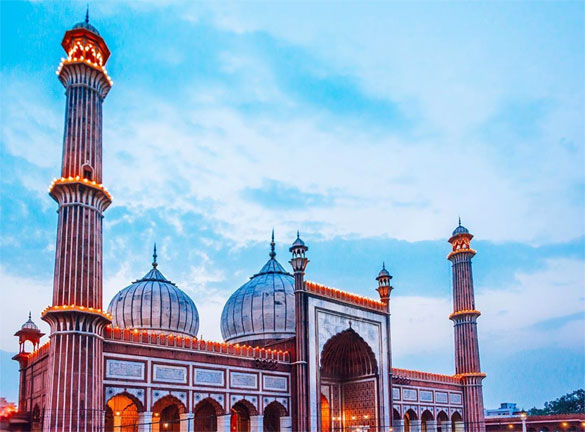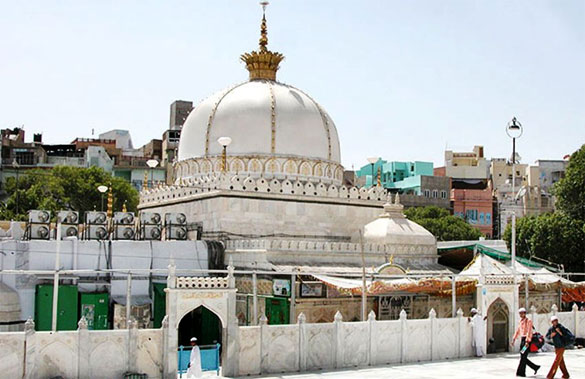Contrary To The Current Communal Narrative, Temples, Mosques And Dargahs Have Been A Part Of India's Syncretic Culture For Centuries
Temples
And Dargahs Never Divided People Of India
Main
Points:
1. Many temples
and mosques are located side by side for centuries.
2. Many temples
were built by Muslim kings and Nawabs.
3. Many Dargahs
are visited by both Hindus an Muslims.
4. Nawab
Shuja-ud-Daula donated land for Hanumangarhi temple.
5. In Kashmir,
many temples are maintained by Muslims.
----
New
Age Islam Staff Writer
30 March
2022

Temple
----
The recent
call for ban on Muslim traders in the premises of Hindu temples has stirred a
controversy. The move has religio-political undertones and so the move is being
opposed even by Hindus who keep India's centuries old syncretic culture close
to their heart.
Temples,
mosques and Sufi shrines called Dargahs have never divided the Hindus and
Muslims, rather they have played an important role in strengthening the
cultural bond. Many Sufi shrines in the country are visited by both Hinds and
Muslims. In fact, Urs at many Dargahs are jointly managed by Hindus and Muslims.
Many Hindu temples were either built by Muslim emperors and Nawabs or funded by
them. Many temples in Kashmir are maintained by local Muslims.
Particularly,
after the exodus of Kashmiri Pandits from Kashmir, many Shiva temples have been
maintained and protected by Kashmiri Muslims and have been functioning as
usual.
There are
many Dargahs, for example, in Maharashtra which are revered and visited by the
devotees from all castes. Dargah of Zinda Pir in Kaigaon in Jalgaon district
and Dargah of Dada Ghulam Ali Shah in the same district are centres of communal
Harmony. The entrance gate of Dargah Ghulam Ali Shah was donated by a Hindu
trader of the locality.
In
Karnataka where the move for ban on Muslim shop owners has been introduced, the
syncretic culture still remains strong. The Dargah of Sufi saint Dawal Malik in
Domanal village in Bijapur district is revered by both Hindus and Muslins and
during the Urs, it is the Hindus who take the lead in managing it.
Another
Dargah in Kalburgi in Karnataka is that of Hadhrat Ruknuddin Tola. Since the
sufi is revered by Hindus as well, devotees are instructed not to visit the
Dargah after having non-vegetarian food.
In Malegao,
Maharashtra, Mahadeo Temple and Jama Masjid are situated side by side in the
densely populated area where shops and looms of both Hindus and Muslims exist.

Jama’ah Masjid, Delhi
----
When
Kashmiri Pandits left Kashmir amid insurgency, they requested their Muslim
neighbours to take care of the temples and the Muslims pledged to them that
thay will protect them at every cost. They kept their promise and have been
protecting the Shiva temples. For example, the Shiva temple on Zobaria Hills in
the outskirts of Srinagar is being maintained by Nissar since 2004. Before him
his father was the caretaker of this temple. Another Shiv temple at Payar,
which is very old is being maintained by one Mushtaque Ahmad Saikh
It is 45 km
from Srinagar. Mushtaque and his family protected the temple during the height
of the insurgency in the 1990s.
Another
temple, Mamalaka Temple which is 900 years old is situated on the bank of
Lidder river. Since there is no priest in the temple, two Muslims, Md Abdullah
and Ghulam Hasan have been serving as priests. They clean and sweep the temple
every day and serve the Prasad to every visitor. While leaving Kashmir, the Pandits
had requested them to keep the temple open and they have kept their request.
Dargah
Khanqah-e-Maula and Rama Kaul Temple stand face to face in Kashmir and remind
Indians of the glorious history of religious harmony in the country.
The Mughal
emperors, particularly, Akbar and Jahangir promoted religious harmony by
granting financial assistance and land to Hindu temples. Jahangir is even said
to have visited Vrindavan and granted land to the Sewaks of the temple. The
Mughals and Nawabs of Awadh patronised many temples in Ayodhya and elsewhere.

Dargah, Ajmer Sharif
-----
These are
only some of the examples of religious harmony promoted from temples, mosques
ad Dargahs in India. Within the premises of every Dargah and temple, markets
have sprung up where shops are owned by the members of all castes. As Muslims
set shop in the premises of temples, so Hindus have shops within the premises
of Dargahs. The controversy of Hindu shopkeeper versus Muslim shop keeper has
never before been heard. During Urs at famous Dargahs, fairs are held in which
traders and artisans belonging to different castes from across the country set
shop and do business together. Never ever the question of banning Hindu traders
occurred to Muslims.
Therefore,
the communal move of banning the traders of a particular community from the
premises of places of worship does not augur well for the multicultural fabric
of India and is also bad for the economy.
New Age Islam, Islam Online, Islamic
Website, African Muslim News, Arab World News, South Asia News, Indian Muslim News, World Muslim News, Women in Islam, Islamic Feminism, Arab Women, Women In Arab, Islamophobia in America, Muslim Women in West, Islam Women and Feminism
